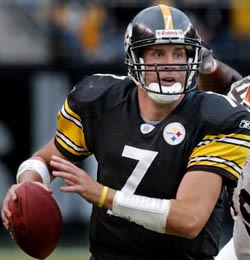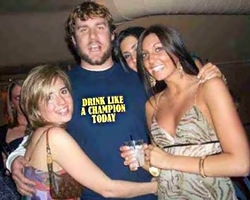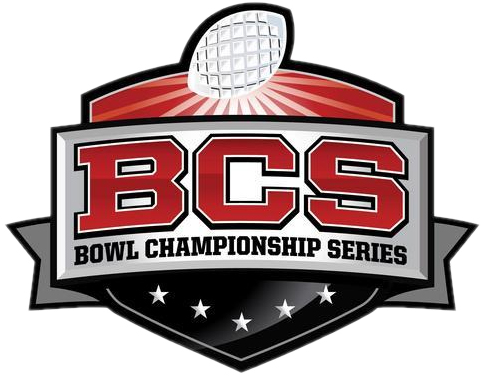The start of the NBA season on Christmas day, as well as loads of new advertising campaigns, somehow spurred my curiosity about the Facebook fanbase and Twitter followers of the professional sports leagues. So, I went and tracked down some counts.
To be clear on my philosophy, more is not inherently better – it’s just more. 100 passionate fans are far more desirable than 1,000 relatively indifferent ones.
Setting the Scene
While Major League Baseball (MLB) is still considered by some to be “America’s game,” the television ratings for the National Football League (NFL) make that notion seem quaint; the NFL is a juggernaut.
The National Basketball Association (NBA), just starting a strike-ish-shortened season and repairing its slightly tarnished rep, is about as strong as it’s been in the past several years and looks very good in these charts.
The National Hockey League (NHL) and Major League Soccer (MLS) are both quite niche in their followings, the former being far more historic, mainstream, and powerful than the latter.
A Note Off the Top
I don’t provide much analysis here. Even the observations in this post are limited. I’ve simply gathered this info, added some color, and shared it. Please let me know your thoughts as a comment on this post, on Facebook (if we’re friends), or on Twitter (everyone’s welcome!).
Now to the Charts
To get started, an overview image of the information I collected:

Facebook Likes and Twitter Followers/Following for Professional Sports Leagues (Dec 2011)
Next up, the same Facebook fans, Twitter followers, and Twitter following information in simple bar charts:
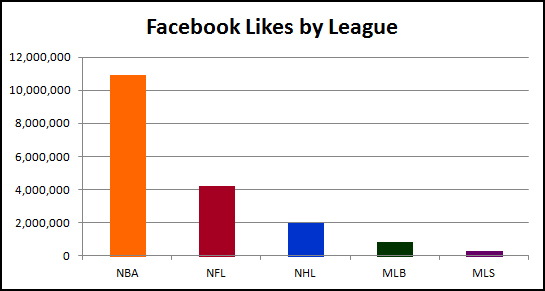
Total Facebook Likes for the NBA, NFL, NHL, MLB, and MLS (Dec 2011)
Though I ordered these alphabetically, the curve from NBA to MLS is obvious and steady.
The NBA has nearly triple the Facebook likes as the second-place NFL. This is likely due to a younger, more global presence and following for the NBA.
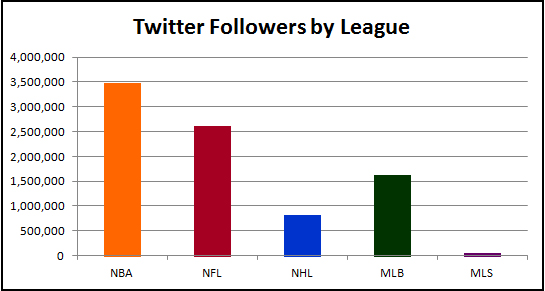
Total Twitter Followers for the NBA, NFL, NHL, MLB, and MLS (Dec 2011)
Though the NBA still leads the way here, the NFL and MLB show up a bit better.
Again, I did not take a look at the quality, quantity, or nature of their Tweets – including such things as ratio of personal @mentions to marketing blast tweets – this is just the number of people who’ve clicked “Follow” without subsequently clicking to “Unfollow.”
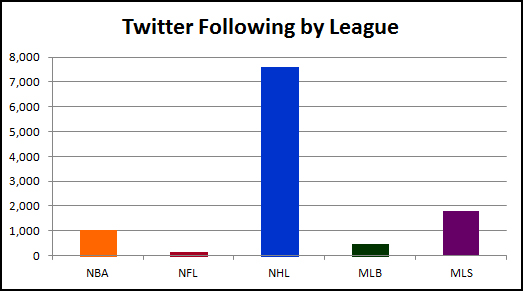
Total Twitter Followings by the NBA, NFL, NHL, MLB, and MLS (Dec 2011)
Here is where it starts to get interesting. The NHL just jumps right off this chart (and the MLS pops up nicely).
I expect it’s because the NHL’s social media is (or was) being handled by Vaynermedia, which obviously subscribes to and lives out the giveback, thank you philosophy of Gary Vaynerchuk. They’re obviously following back; I expect they’re also listening, responding, and engaging more than any other league on Twitter (again, MLS is probably with them on this).
Note: see a cool interview of Matt Sitomer of Vaynermedia by David Siteman Garland of The Rise to the Top about “How to Land Badass Clients Like the NHL and the New Jersey Nets” here.
Meanwhile, the NFL barely gets a stripe to represent the number of people they’re following on Twitter (just 150!).
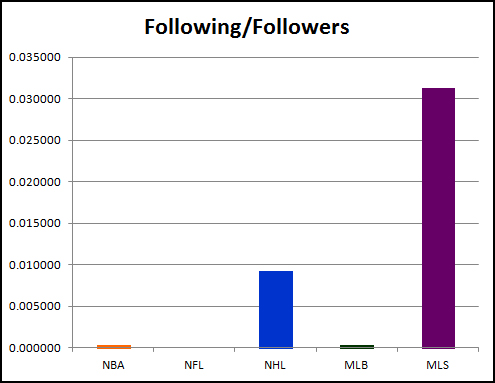
Ratio of Twitter Following to Twitter Followers for the NBA, NFL, NHL, MLB, and MLS (Dec 2011)
The previous chart sets up this one. This is Twitter Following (number of people each league is following) divided by Twitter Followers. Again, the NHL and MLS own this chart.
The MLS bar is largely a function of their relatively few Twitter followers. The NHL is following more than 4x as many people as the MLS. Still, both of these leagues – far smaller than the NBA, NFL, and MLB by most measures – are obviously employing a participatory strategy on Twitter.
As a function of their strong Twitter following and limited (or absent) follows back, the NFL does not even register. The NBA and MLB are just slivers. They’re broadcasters – just blasting out information.
Final Thoughts
It would obviously be interesting to go deeper in at least three ways:
- putting this information into the context of revenue, attendance, and viewership of each league
- evaluating the character, quality, quantity, and frequency of posts in the context of this information
- looking at the social media approach of the individual franchises relative to those of the leagues
As a husband, father, full-time marketer, part-time MBA candidate, and very occasional blogger, I’ll leave that to you! Let me know what you dig up and process.
In the meantime, let me know your thoughts about what I’ve gathered and shared here as a comment on this post, on Facebook, or on Twitter.
Thanks!
Links
National Basketball Association: NBA.com | Facebook | Twitter
National Football League: NFL.com | Facebook | Twitter
National Hockey League: NHL.com | Facebook | Twitter
Major League Baseball: MLB.com | Facebook | Twitter
Major League Soccer: MLSSoccer.com | Facebook | Twitter
